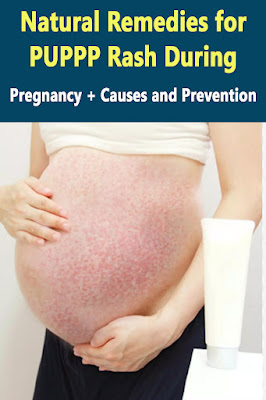Natural Remedies for PUPPP Rash During Pregnancy + Causes and Prevention
Pruritic urticarial papules and plaques of pregnancy (PUPPP), also known as polymorphic eruption of pregnancy, is a common skin condition that affects pregnant individuals, typically occurring during the third trimester. Characterized by itchy red bumps and plaques on the abdomen, PUPPP can be uncomfortable and distressing. While medical treatment may be necessary in severe cases, several natural remedies can help alleviate symptoms and provide relief.
Causes of PUPPP Rash:
- Hormonal Changes: Fluctuations in hormone levels, particularly increased levels of estrogen and fetal cells in the maternal circulation, are believed to play a role in the development of PUPPP rash.
- Stretching of the Skin: Rapid stretching of the abdominal skin as the uterus expands to accommodate the growing baby may trigger inflammation and the formation of PUPPP lesions.
- Genetic Factors: A predisposition to allergic reactions or skin conditions like eczema may increase the risk of developing PUPPP rash during pregnancy.
- Fetal Gender: Some studies suggest that carrying a male fetus may be associated with a higher incidence of PUPPP rash compared to carrying a female fetus.
Natural Remedies for PUPPP Rash:
- Cool Compresses: Applying cool compresses or ice packs to the affected areas can help soothe itching and reduce inflammation associated with PUPPP rash.
- Oatmeal Baths: Adding colloidal oatmeal to lukewarm bathwater and soaking in it for 15-20 minutes can help relieve itching and soften the skin.
- Aloe Vera Gel: Aloe vera gel has moisturizing and anti-inflammatory properties that can help calm irritated skin and alleviate itching caused by PUPPP rash.
- Calamine Lotion: Topical application of calamine lotion can provide temporary relief from itching and help dry out PUPPP lesions.
- Coconut Oil: Massaging coconut oil onto the affected areas can help hydrate the skin and reduce itching associated with PUPPP rash.
- Chamomile Tea: Applying cooled chamomile tea to the skin or taking chamomile tea baths may help soothe inflammation and itching caused by PUPPP rash.
- Witch Hazel: Witch hazel has astringent properties that can help reduce itching and inflammation associated with PUPPP rash when applied topically.
- Avoiding Triggers: Identify and avoid potential triggers of PUPPP rash, such as hot showers, tight clothing, and harsh soaps or detergents.
Preventive Measures for PUPPP Rash:
- Moisturize: Keep the skin well-hydrated by regularly applying fragrance-free moisturizers or emollients to prevent dryness and minimize the risk of PUPPP rash.
- Wear Loose Clothing: Opt for loose-fitting, breathable clothing made from natural fibers like cotton to reduce friction and irritation on the skin.
- Practice Good Skincare: Use gentle, hypoallergenic skincare products and avoid harsh chemicals or fragrances that may exacerbate PUPPP rash symptoms.
- Stay Cool: Avoid overheating and excessive sweating by staying in cool, well-ventilated environments and wearing lightweight clothing during hot weather.
- Manage Stress: Practice stress-reduction techniques such as yoga, meditation, or deep breathing exercises to help minimize the impact of stress on hormonal balance and skin health during pregnancy.
Conclusion: While PUPPP rash during pregnancy can be uncomfortable, natural remedies and preventive measures can help manage symptoms and promote skin health. However, it's essential to consult with a healthcare provider or dermatologist before trying any new treatments, especially during pregnancy. By incorporating these natural remedies and lifestyle adjustments into their routine, pregnant individuals can alleviate discomfort and enjoy a smoother, more comfortable pregnancy experience.
